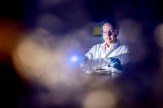Northeastern University Professor Receives $1.4 MillionNIH Grant to Study Genetics of Resistant Bacteria
BOSTON – April 10, 2008 – Dr. Kim Lewis, Professor of Biology and Director of the Antimicrobial Center at Northeastern University, has been awarded a $1.4 million grant from the National Institutes of Health (NIH) to examine the genetics of multidrug tolerance in bacteria. This four-year grant will allow Lewis, who recently received a grant from the Bill & Melinda Gates Foundation to study the latency of tuberculosis, to continue his research on the formation of dormant persister bacterial cells, which are tolerant to all known antibiotics and make many infections incurable. By using a genomics approach, the team hopes to identify the genes responsible for the formation and maintenance of these persister cells and to develop a therapy to destroy them.
The first component of this research project is to produce mutants with the capacity to produce a large number of dormant persister cells. To do this, the researchers will work with two bacteria, E. coli and Y. pestis, to produce high persistence (hip) mutants with the ability to produce large amounts of persister cells. The next phase will be done in collaboration with James Galagan, Ph.D., an Associate Director at the Broad Institute of MIT and Harvard and a co-investigator for this grant, where they will sequence the genomes of 100 hip mutants to identify the mutations, which will help decipher the mechanism responsible for antibiotic tolerance.
“The goal of this research project is to identify the mechanism behind the phenomenon of resistant bacteria,” said Lewis. “We know that pathogens produce dormant persister cells, which then resist antibiotics, but we need to know how it happens in order to develop effective treatments against these dormant cells.”
Because persister cells are thought to be responsible for chronic diseases, such as tuberculosis, Dr. Lewis’ work on identifying the origin of persister cells is an important contribution to this critical field of research.
According to the NIH review panel that evaluated the proposal, “The study has the potential to provide viable clinical strategies to manage infections in which persister cells are the main driver of suboptimal response to antibiotic treatment and consequently revolutionize antibiotic targeting and therapy.”
For more information about Dr. Lewis’ research, please contact Jenny Eriksen at (617) 373-2802 or via email at j.eriksen@neu.edu.
About the Antimicrobial Discovery Center
The mission of the Antimicrobial Discovery Center, founded in 2006, is to translate basic science discoveries into novel antimicrobial therapies to combat Biowarfare and conventional pathogen threats. Antimicrobial drug discovery is in a state of crisis. The last class of broad-spectrum compounds, the fluoroquinolones, was discovered 40 years ago. The rise of multidrug resistant pathogens and the threat of genetically engineered bioweapons represent an urgent need for novel antimicrobial therapies. The Center, funded by grants from the NIH, NSF, and DOE, is directed by Kim Lewis and draws faculty members from Biology, Chemistry, Physics, and Pharmaceutical Sciences.
About Northeastern University
Founded in 1898, Northeastern University is a private research university located in the heart of Boston. Northeastern is a leader in interdisciplinary research, urban engagement, and the integration of classroom learning with real-world experience. The university’s distinctive cooperative education program, where students alternate semesters of full-time study with semesters of paid work in fields relevant to their professional interests and major, is one of the largest and most innovative in the world.The University offers a comprehensive range of undergraduate and graduate programs leading to degrees through the doctorate in six undergraduate colleges, eight graduate schools, and two part-time divisions.For more information, please visit www.northeastern.edu.





